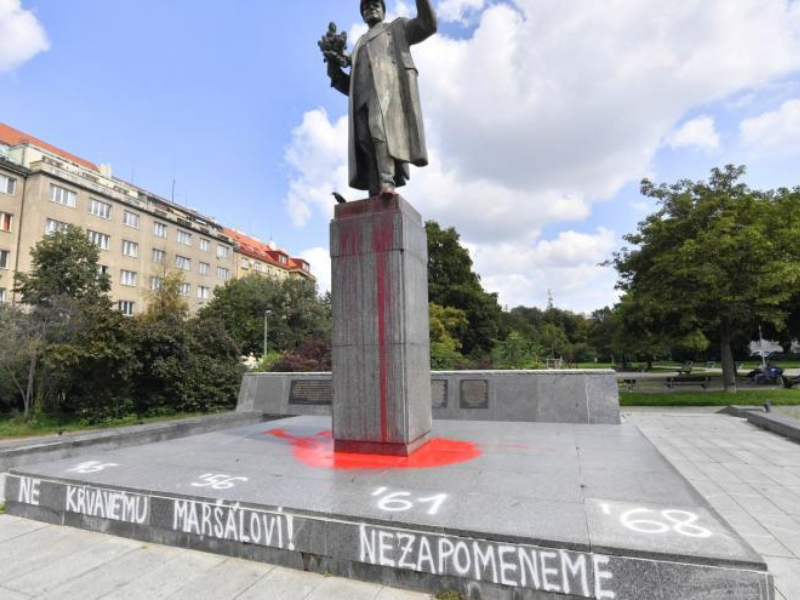Czech President Miloš Zeman will attend celebrations marking the 75th anniversary of the Soviet Union’s Victory over Nazi Germany, which was scheduled to take place on May 9 but had to be postponed due to the coronavirus, as Zeman himself told Radio Frekvence 1 on Sunday.
“I accepted President Putin’s invitation,” Zeman pointed out. “I suppose that the celebrations will take place in September instead of May 9.
“It would be logical because World War II ended in September, and it was the war in Europe that came to an end on May 9,” he added.
Russian President Vladimir Putin announced on Thursday that the Victory Day parade and the Immortal Regiment march, initially set for May 9, would take place later in the year after the coronavirus threat is over.
The “risks associated with the epidemic, whose peak has not passed yet, are extremely high,” Putin said. “This does not give me the right to begin preparations for the parade and other mass events now.”
Victory Day is the most important public event remaining in Russia’s calendar. Western leaders have snubbed the parade since 2014, following Russia’s annexation of Crimea from Ukraine. Moscow’s alleged meddling in the US presidential elections and the poisoning of Sergei Skripal in Salisbury in 2018 have made relations even chillier.
Russia holds a military parade on Red Square with soldiers, tanks and intercontinental ballistic missiles and sees hundreds of thousands march with pictures of their relatives in a new tradition called the Immortal Regiment.
The number of Russian coronavirus cases has been accelerating in the last week.
There have been 47,121 cases of infections and 405 deaths, according to official figures, but the real number is believed to be higher.
Authorities in the northwestern Bubeneč district announced that they can no longer keep cleaning the monument to Marshal Ivan Konev after continuous acts of vandalism against it, so they decided to cover it with a tarpaulin.
The move, announced by the mayor of Prague 6, Ondrej Kolar, caused an immediate backlash. Several dozen people protested against the decision on Monday at the statue’s location, including the Czech president’s spokesman Jiri Ovčaček.
“We have different opinions and we choose different political parties, but one thing connects us, we reject the rewriting of history and we reject people who trample on the values of democracy,” Ovčaček said in a speech.
He was one of the multiple Czechs protesting the covering-up as it happened. He posted a photo of him bowing his head before Konev’s statue on his Twitter account, calling him “liberator of the Czech Republic and of the Auschwitz death camp.”
The Russian Embassy condemned the timing of Kolar’s decision, made “in the run-up to the 80th anniversary of the most horrific military conflict in human history.” The embassy claimed it has received numerous letters from Czech citizens denouncing this move, with some “wondering which side would the incumbent municipal government of Prague 6 district support during World War Two.”
While the embassy did not provide specific examples of the letters, denunciation of the act from the Czech general public was evident. A man named Jiri Cernohorsky, described as “anti-immigration activist and supporter of the Russian Federation” removed the cover in protest on Friday and again during the Monday protest, and was reportedly apprehended by police for that.
In response to criticism, district boss Ondrej Kolar said the Konev statue is targeted for vandalism at least twice a year. He believes this illustrates the district population’s negative attitude towards Konev and called those gathered for Monday’s protest “extremists united by… a blind love for Russia.”
The monument to Konev was unveiled on May 9, 1980, the 35th anniversary of the liberation of Prague by the troops of the 1st Ukranian Front, commanded by Konev. While hailed as a WWII liberator, Konev’s post-war actions still spark controversy because of his role in the suppression of the Hungarian uprising in 1956 and the so-called Prague Spring of 1968.
The statue of Soviet Marshal Ivan Konev has been vandalized on the anniversary of the Soviet-led invasion of Czechoslovakia in 1968.
The Prague 6 district said on its Facebook page on August 22, a day after the anniversary, those unknown individuals poured red paint on the statue and wrote with white paint on its base: “No to the Bloody Marshal! We will not forget.”
Prague city authorities say police are investigating the act of vandalism. Konev’s statue has been vandalized several times in recent years.

Authorities of the Czech capital’s district, where the statue was erected in 1980 to commemorate Konev’s role in liberating Czechoslovakia from Nazi occupation, have suggested moving the statue to a park near the Russian Embassy.
Marshal Konev (1897-1973) led Soviet troops that liberated most of Czechoslovakia’s territory and entered Prague on May 9, 1945.
In 1946, Prague’s Podebradska Street was renamed after him. Local authorities have been considering changing the street back to its previous name for several years.
In 1956, Konev took part in the brutal suppression by Soviet troops of the Hungarian uprising in Budapest.
In 1961, he was the commander of the Soviet troops in East Germany when the Berlin Wall was erected, and some historians say he also participated in planning the Soviet-led invasion by Warsaw Pact troops of Czechoslovakia in August 1968.

